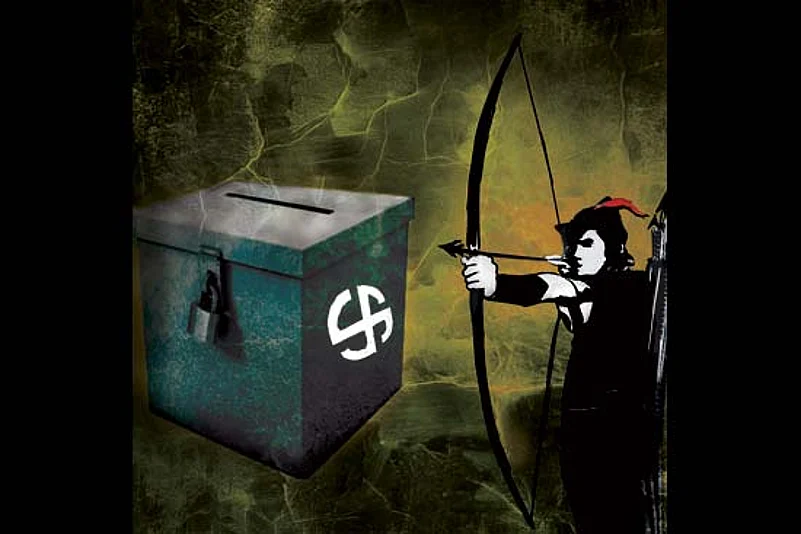The central question in the turmoil inside the Aam Aadmi Party (AAP) is one of how astute is the Indian voter? Arvind Kejriwal, as reported, believes the voter is susceptible to rhetoric and indifferent to corruption. Yogendra Yadav and Prashant Bhushan believe the voter is contemptuous of the corrupt, the communal, the criminal. After the Delhi election results, pundits were quick to attribute moral acuity to voters—that they had taught the haughty and mighty a lesson.
In the middle of such optimism about the enlightened voter, the byelection results in Srirangam, Tamil Nadu, declared on February 16, present a sobering reminder. The byelection was the result of a Supreme Court judgement stripping elected representatives of their office upon conviction. The byelection in Srirangam was necessitated by the conviction of Chief Minister J. Jayalalitha in September 2014 in a corruption case. What Jayalalitha did was to make an emotional appeal to voters: as leader of her All-India Anna Dravida Munnetra Kazhagam (AIADMK) party, she implored the voters of Srirangam to “imagine” she herself was contesting again and come out in large numbers to vote for her party. In short, she dared voters to send a message that her criminal status, as deemed by the courts, was inconsequential and the SC ruling disqualifying her was misplaced.
The voters complied: 82 per cent of registered voters turned up and 70 per cent of them voted for the AIADMK. Never before have so many turned up and voted for one party. While byelections in Tamil Nadu have a record of proving favourable to the ruling party (as in this case), it must be noted that no byelection in the state since 1990 has seen such a massive turnout and mandate. It’s quite clear the voters had a point to prove.
A year before Jayalalitha’s eviction from office, Laloo Prasad Yadav, the leader of the Rashtriya Janata Dal (RJD) was disqualified as a Lok Sabha MP and prohibited from running for office following his conviction in a corruption scam in Bihar. In the Lok Sabha election of 2014, in his constituency of Saran in Bihar, he fielded his wife Rabri Devi as a blatant proxy. She lost to Rajiv Pratap Rudy of the BJP. Pundits immediately painted this as voters’ contempt for the corrupt. In fact, Rabri Devi polled 15 per cent more votes in the 2014 election than her husband in 2009. Her loss was due largely to the quirks of our first-past-the-post electoral system than any voter contempt for her or her husband. The JD(U) which is a more direct rival to the RJD in Bihar, played spoiler by taking away 12 per cent of the vote, enabling Rudy’s win. So while the SC hopes to cleanse politics of convicts, voters seem astonishingly nonchalant.
One more example. The 2014 Lok Sabha election results evoked claims that the Indian voter had vanquished the corrupt, scam-ridden UPA, infamous for the 2G scam. At the head of this scam stood former telecom minister A. Raja, who was jailed for 15 months for his role in the scam. Between 2009, when Raja was elected MP from the Nilgiris constituency, and 2014, when he recontested from the Nilgiris, Raja had gone from being a minister to being sacked, jailed and pilloried. Yet, there were 40,000 more (yes more, not less) voters that voted for Raja in 2014 than in 2009. Conspicuous coincidences led to the BJP candidate’s nomination in the Nilgiris being rejected and helping the AIADMK candidate defeat Raja. It is not abundantly evident that Raja would have lost his election in 2014 under ‘more normal’ circumstances. When presented with a menu of candidates, one of whom had soared to notoriety for allegedly masterminding one of India’s biggest scams in history, the voters in the Nilgiris didn’t exactly cringe from voting for him.
These three examples—Jayalalitha, Laloo Yadav and Raja—are merely symbolic of the larger Robin Hood undertones of Indian politics today. Notions of what constitutes a serious crime seem to vary dramatically among different sections of our society, as evidenced in electoral data. An inefficient state that has failed its citizens for far too long has resulted in local chieftains robbing the rich to pay the poor and win popularity. This is the more plausible narrative than today’s mainstream narrative of “the voter is angry with the corrupt”. Too often, editors and experts rush into painting simplistic narratives of electoral verdicts through a naive, binary winner-loser paradigm. The prism of electoral data offers a richer view of the contours of Indian society—for those who care to look before leaping to judgement.
(The author is an ex-CEO of an investment bank, an electoral data scientist and founding trustee of IndiaSpend.)

























